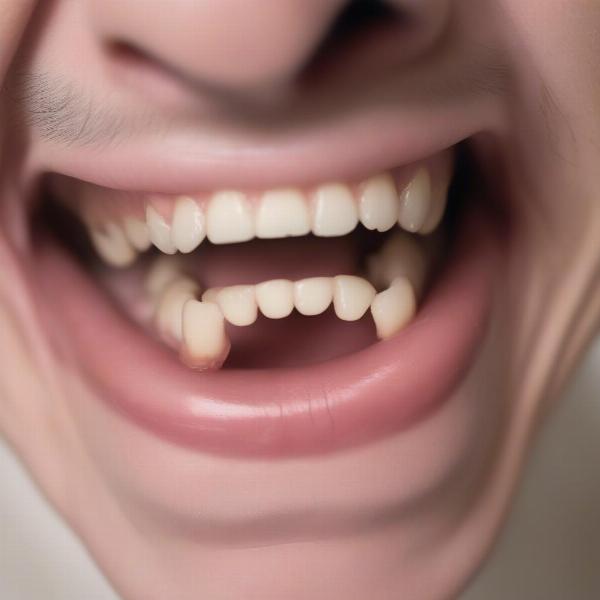Bad breath in dogs, also known as halitosis, is a common concern for pet owners. While a little doggy breath is normal, persistent bad breath can be a sign of underlying health issues or simply poor dental hygiene. Thankfully, dog chews for bad breath offer a convenient and enjoyable way to combat this smelly situation. They can help clean teeth, freshen breath, and improve overall oral health. This article will explore the various types of dog chews designed to tackle bad breath, how they work, and what to look for when choosing the best option for your furry friend.
Understanding the Causes of Bad Breath in Dogs
Before diving into the world of dog chews, it’s crucial to understand what causes bad breath in the first place. The most common culprit is the buildup of plaque and tartar on your dog’s teeth. This creates a breeding ground for bacteria, leading to that unpleasant odor. Other potential causes include gum disease, dental infections, kidney or liver problems, and even certain types of food. If your dog’s bad breath is persistent or accompanied by other symptoms like drooling, difficulty eating, or swollen gums, consult a veterinarian to rule out any underlying health conditions.
 Causes of Bad Breath in Dogs
Causes of Bad Breath in Dogs
Choosing the Right Dog Chews for Bad Breath
With a plethora of dog chews available on the market, it can be challenging to select the best one for your dog’s needs. Look for chews specifically designed for dental health and breath freshening. These chews often have textures and ingredients that help scrape away plaque and tartar.
- Dental Chews: These come in various shapes and sizes and are designed to mechanically clean your dog’s teeth as they chew.
- Breath Freshening Chews: These often contain ingredients like parsley, mint, or chlorophyll to neutralize odors.
- Natural Chews: Chews made from natural ingredients like bully sticks, rawhide, or sweet potato can also be beneficial for oral health, but choose wisely. probiotics for dogs south africa can also contribute to overall gut and oral health.
Ingredients to Look For and Avoid
When choosing dog chews for bad breath, pay close attention to the ingredients list. Look for chews with natural ingredients and avoid artificial flavors, colors, and preservatives. Some beneficial ingredients include:
- Chlorophyll: A natural deodorizer that can help neutralize bad breath.
- Parsley and Mint: These herbs have natural breath-freshening properties.
- Enzymes: Certain enzymes can help break down plaque and tartar.
Ingredients to avoid include:
- Artificial Sweeteners: These can be harmful to dogs.
- Excessive Sugar: Can contribute to plaque buildup.
- Rawhide: Can pose a choking hazard for some dogs. Always supervise your dog when they are chewing on rawhide.
How Often Should You Give Your Dog Breath Freshening Chews?
The frequency of giving your dog breath freshening chews depends on the type of chew and your dog’s individual needs. Some chews can be given daily, while others are recommended only a few times a week. Always follow the manufacturer’s instructions and consult your veterinarian if you have any questions. gum disease in dogs photos can help you identify potential issues early.
Beyond Chews: A Holistic Approach to Dental Health
While dog chews can be a valuable tool in combating bad breath, they should be part of a comprehensive dental care routine. Regular brushing with a dog-specific toothbrush and toothpaste is essential. dental chart dog can be a valuable tool to track your dog’s dental health. You can also consider dental treats and toys, as well as regular professional dental cleanings. is a dog mouth cleaner than a human mouth? This is a common misconception, and proper dental care is crucial for canine health.
Conclusion: Fresh Breath and a Happy Dog
Dog chews for bad breath offer a simple and effective way to improve your dog’s oral hygiene and freshen their breath. By choosing the right chew and incorporating it into a holistic dental care routine, you can help your canine companion enjoy a healthy mouth and happy smiles. Don’t forget to consult with your veterinarian for personalized recommendations and to address any underlying health concerns. toothbrush for dogs teeth can be discussed with your vet for recommendations.
FAQ:
- Are all dog chews good for bad breath? No, some chews are designed for other purposes like entertainment or joint health. Look for chews specifically marketed for dental care and breath freshening.
- Can dog chews replace brushing my dog’s teeth? No, chews are a supplement to brushing, not a replacement. Regular brushing is essential for optimal dental health.
- What should I do if my dog’s bad breath persists despite using chews? Consult your veterinarian. Persistent bad breath can be a sign of an underlying medical condition.
- Can puppies use breath freshening chews? Yes, but make sure to choose chews appropriate for their age and size.
- Are there any side effects to using dog chews for bad breath? Some dogs may experience digestive upset if they are not used to certain ingredients. Always introduce new chews gradually.
- How can I tell if a dog chew is working? You may notice an improvement in your dog’s breath within a few days or weeks of regular use. You may also see less plaque and tartar buildup on their teeth.
- What are some other ways to freshen my dog’s breath? Regular brushing, dental treats, and professional cleanings can all help improve your dog’s breath.
ILM Dog is a leading online resource for dog owners worldwide, offering expert advice on all aspects of dog care, from breed selection and training to nutrition and health. We are dedicated to providing practical and reliable information to help you make the best choices for your furry friend. Whether you’re a seasoned dog owner or just starting out, ILM Dog is here to support you every step of the way. Contact us at [email protected] or +44 20-3965-8624 for personalized guidance.